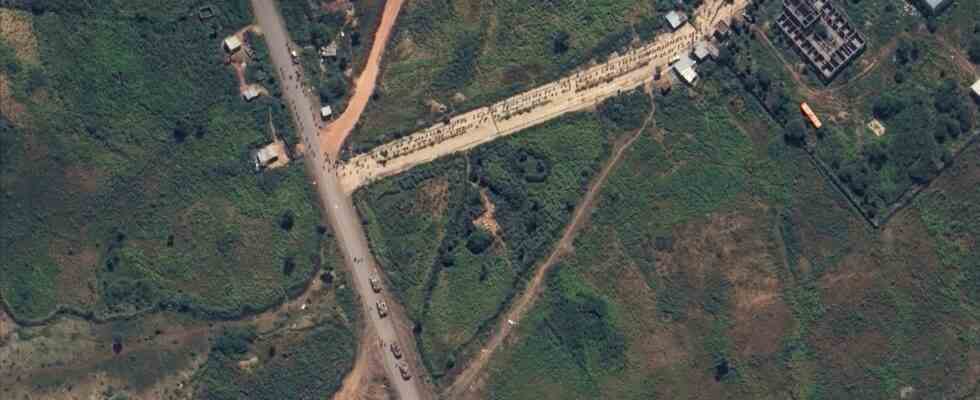Status: 10/15/2022 4:53 p.m
One of the world’s bloodiest conflicts is raging in Ethiopia’s Tigray province. Observers draw comparisons to the First World War. But worldwide attention remains low – which also affects the course.
It is about Ethiopia’s northern region of Tigray and, in short, the question of who is in charge there: the central government in Addis Ababa or the Tigray People’s Liberation Front (TPLF), which is rooted in the region. In the dispute over regional elections and more political independence, the national Ethiopian armed forces and their allied troops from neighboring Eritrea occupied the region from November 2020, but were then pushed back. In March of this year there was a ceasefire that lasted until August. Since then the war has been raging again – apparently even more bitter than in the first phase. The number of soldiers killed since the beginning of the war is increasing rapidly.
“Losses in the six-figure range are now expected,” says Ethiopia expert Ulf Terlinden from the Heinrich Böll Foundation in Nairobi. The conflict is carried out using methods that are mainly known from the First World War: In some operations, thousands of fighters rushed at each other in waves. According to military experts, the loss rate is around 40 percent, Terlinden estimates: “And we haven’t even talked about the civilian victims of the conflict.”
Expert reports on major crimes
Here, too, the first detailed report by the “UN Commission of Human Rights Experts on Ethiopia” paints a picture of horror. Executions, rape, sexual violence and starvation of the civilian population have been a means of warfare from the beginning, it says.
There are good reasons to believe that “killing livestock, destroying food stores and cutting down crops, and restricting humanitarian access to Tigray” have been tactics used by the central government and its allies so far, said commission chair Kaari Betty Murungi . Six million people are denied access to electricity, the Internet, telecommunications and banking. Now the commission is to investigate whether “crimes against humanity” have been committed. The government in Addis Ababa calls the report unfair and one-sided.
However, the report also accuses the TPLF’s combat units, the Tigray Defense Forces (TDF), of possible war crimes – such as rape, looting and destruction in the area of the adjacent Amhara region. The fact is that the number of civilians killed and injured can hardly be estimated; according to UN figures, the number of internally displaced people in the north of the country is 2.6 million. Another 9.4 million lack food and many lack shelter.
A new ceasefire seems far away
There is no end in sight. In the new phase of the war, Tigray is mainly under pressure from the new, massive entry into the war by Eritrea, which has entered into an alliance with Ethiopia’s Prime Minister, Nobel Peace Prize winner Abiy Ahmed.
Eritrea’s despot Isayas Afewerki, whose country is often simply called “North Korea of Africa”, has mobilized. “Giffa” is the name given to the actions in which women, men and even minors are pressed into the army, according to the responsible UN rapporteur. In the meantime, all reservists of military age have been drafted – those who refuse end up in one of the regime’s notorious prisons, human rights experts complain.
Both sides – the TDF as well as the government alliance – were not unprepared for the armed conflict. The TDF had always mistrusted the ceasefire and was under pressure from the population due to the supply blockade. The government troops had to be reassembled after the last devastating armed conflict, in solidarity with the Eritreans.
Now Abiy and Afewerki seem to put everything on one card: Tigray should apparently be completely subdued. Even if the Alliance were to make more strides on the battlefield than seems to be the case, it would not be easy: the Tigrayans have learned painfully what occupation is and have largely rallied behind their leadership – even those who have declared none TPLF supporters are.
“Media interest is sucked up”
Therefore, the question of a ceasefire or even a peace will probably remain unanswered for a long time. For Abiy and the Tigrayers it’s a question of survival, the involvement of the hated dictator from the neighborhood in Tigray doesn’t make it any easier. The mere question of who could and could not sit at a negotiating table is difficult. And who should mediate?
William Davison, an expert at the International Crisis Group, fears that the world public is showing little interest in the critical issues: “International media interest is being absorbed by the Ukraine-Russia war. It’s the same with diplomatic and, to some extent, humanitarian efforts,” says he. “This is a serious setback in a situation where there was already not enough attention and resources for the conflict.”

